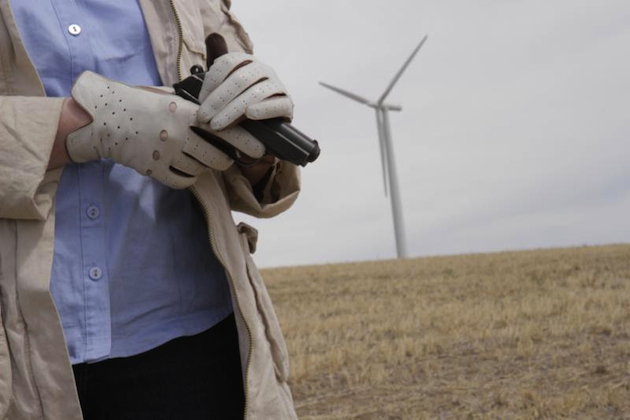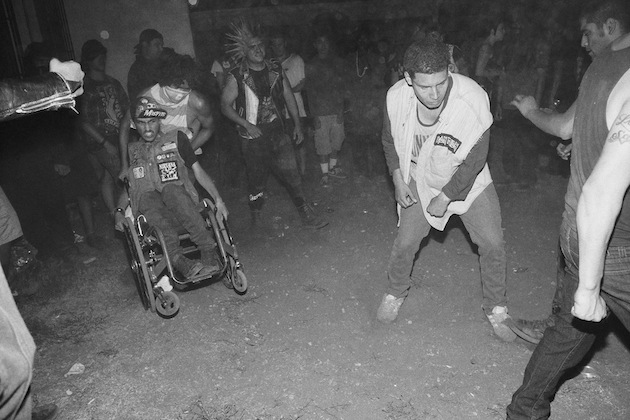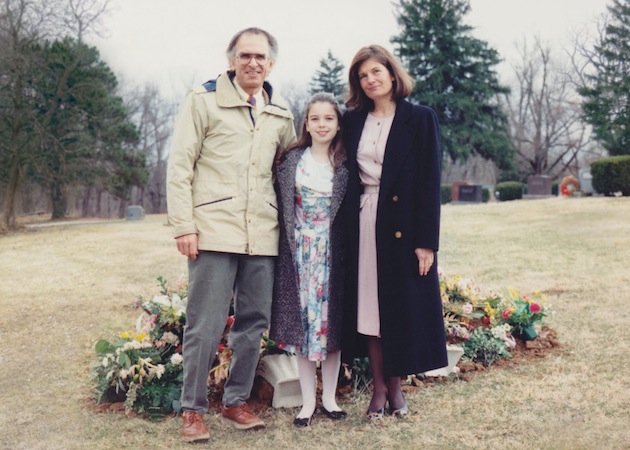Slamdance 2016 Preview: Meet The Filmmakers, Part 1
The reason I consider the Slamdance Film Festival a high priority on the fest circuit can be summed up in one word: Discovery.
While most press mention fest alumni like Christopher Nolan, The Russo Brothers and Lena Dunham, I'd like to highlight that just three years ago, first-time feature director Matt Johnson made the most subversive and smart film to play in all of Park City. The Dirtiest went on to win the Slamdance Grand Jury Prize, catch the eye of Kevin Smith, then took Johnson and his tight-nit Toronto crew right to the doorstep of Lionsgate. They are now premiering Operation Avalanche in the NEXT category at Sundance.
Today, I welcome you to discover a handful of fresh filmmakers from across this
year's intriguing slate who were nice enough to fill out a little Q&A I concocted. Make sure to come back on Wednesday for part 2. Plus, on Thursday, Jeremy O. Harris and I will post our Top Picks for the fest.
The 22nd Slamdance FIlm Festival takes place in Park City, Utah at Treasure Mountain Inn, January 22 - 28.





Nathan Williams, IF THERE'S A HELL BELOW - Narrative Competition
Tell us about your film, but not in a plot-centric way, please…
You have to trust someone.
There is no more vital question in our lives today, no question that more defines who we are and what we do than this: who do you trust, and why?
If There's A Hell Below cuts into you with this basic question but offers no simple answer. It’s no coincidence that “if” is in the title--there’s very little you can take for granted. The film is a waking nightmare: a story about not what has happened or will happen but what can happen.
So take a seat, put the car into gear, and keep an eye on your rear view mirror…
Share with us a pivotal cinema related experience or moment for you
Seeing Gilliam's The Adventures Of Baron Munchausen on opening day in 1989. It's a hot (beautiful) mess of a film, but it made me realize that I was put on earth to do this. The good Baron telling tall tales in that decrepit theater as the city disintegrates--as vital a case for art as this eight-year-old was likely to see.
Why Slamdance?
It's the premiere festival for truly independent American cinema. It also is where the matriarch of Seattle film and a personal role model (Lynn Shelton) debuted her first feature.
Your essential Park City survival kit:
Wool watch cap. Thorogood boots. Meerschaum pipe. Four good friends who made the whole thing possible.
Angela Boatwright, LOS PUNKS - Documentary Competition
Tell us about your film, but not in a plot-centric way, please…
Los Punks is essentially about four young people that participate in the backyard punk scenes in Boyle Heights, East L.A., and South Central Los Angeles. In various neighborhoods throughout Los Angeles and Southern California, punks throw shows in their backyards, driveways, alleyways, and various other non-traditional, D.I.Y establishments - wherever and whenever they can. Venues are too expensive and way too restricted. And if you're under 18 and don't have access to transportation, backyards are your home. In Los Punks you will meet only a small handful of the thousands of predominantly Hispanic youth that keep the scene alive.
Share with us a pivotal cinema related experience or moment for you
I'm a lifelong, extremely passionate metal and punk fan. I started going to see bands play regularly when I was 13 years old and literally haven't stopped since. When I turned 16 I started taking photos, at 18 I moved to New York City, and at 22 I began working solely as a photographer. But I never had any interest in directing films. It wasn't until I found myself sharing an office space in Brooklyn with dozens of film industry professionals that I even considered it. (Wolfpack producer, Alex Orlovsky included.) I was 12 years old when Decline of Western Civilization Part II: The Metal Years came out, I think I've seen that movie over 500 times. Looking back on everything I've experienced and loved throughout my life thus far it makes complete sense that I'm directing documentaries now, especially documentaries about punk and metal. Without knowing it I've been working towards this goal my entire life.
Why Slamdance?
I'm so excited to be a part of Slamdance! It's such a great festival for a big-hearted, youthful movie like Los Punks. The energy of the festival and our film match perfectly.
Your essential Park City survival kit:
I have a pair of really rugged winter boots that I bought many years ago for a snowy, winter photo shoot in Bariloche, Argentina which is located literally on top of the Andes mountains. I've used these boots twice in ten years and am incredibly excited to bring them to Park City for a third run! I will also be bringing my camera as I'm sure the views will be gorgeous!
Derek Kimball, NEPTUNE - Narrative Competition
Tell us about your film, but not in a plot-centric way, please…
My film is called Neptune and it's among other things a meditation on place. More specifically on Maine.
In Maine, there is still a lingering, ancient quality that I think keeps those of us who live here tethered to the folk world. In an effort to tip my hat to the place I grew up in, I sought to convey this feeling of place with its underlying mythological textures wrapped up in an ordinary costume; A coming of age story. In this way, the film has helped me better understand what really makes a place.
Yes, there are sights and sounds and events anywhere, but all of us can read deeper into those intangible textures and feelings we get from a place and often we can agree on those feelings, skirting the periphery of our memory of it, looking for the right words. Cinema, I think, is better equipped to convey these textures than other art forms in that it can mimic a sensory experience and that was, to the best of my ability, my approach.
Share with us a pivotal cinema related experience or moment for you
When I was 7 or 8, I had written a short story called "Attack of the Killer Puppets" which is an excellent title. This film was set in Barclay mansion and featured some kids taking on some killer puppets and I think that was most likely the extent of it. So anyway, I rallied a couple of friends to help me and during the course of about 5 recesses I had managed to convince a large number of students to participate in the film, while others generously gave me their lunch money to help in the effort. By the 2nd week even teachers were chipping in. I was collecting all of this money in a flour tin where I kept my halloween make up. This was to be an enormously ambitious project! The only issue was that I didn't own a camera and so I spent all of that money on candy instead. The guilt of that venture caught up with me, sure enough, but I did learn a valuable lesson about crowd funding and community engagement. Both necessary skills in our situation.
Why Slamdance?
I think the question for many filmmakers is "What do I do with my film?" and this, I'm sure, was always tricky business. But now with the strange duality of unprecedented access to equipment and DIY distribution and the monopoly on the megaplexes, I think the terrain has become even more uncertain. Slamdance is one of those institutions that has such purity of purpose in its support of new filmmakers and their visions that it's a bit of a beacon in the dark. We need entities like Slamdance to encourage filmmakers to stick to their guns. Film is after all an art form and we must always challenge convention, always reinvent. When a festival rewards efforts that are essentially indy blockbusters, their program can't hope to push the envelope. Slamdance is out there looking for the new weirdos and they're doing it right.
Your essential Park City survival kit:
Never been to Park City but point me to the whiskey and that's where I'll be.
Molly Gandour, PEANUT GALLERY - Documentary Competition
Tell us about your film, but not in a plot-centric way, please…
Peanut Gallery is one of those films that came out of necessity. In my mid-twenties there was nothing ostensibly wrong with my life but I just felt disconnected, disassociated. From going to multiple therapists I began to gather that my sister's death might have had a stronger affect on me than I previously suspected.
I knew my parents were the only people who had the information I needed to piece the story together and, honestly, approaching them with a film project felt somehow safer than just asking them to talk. If they'd refused to do the film, I still would've wanted to do therapy with them — and during the shooting I made a point to always prioritize my experience with them ahead of the filmmaking process. But somehow, having the camera there in the room was a comfort to me, I felt like I finally had a witness to my story and to our family tragedy. The filmmaking process, for me, was a grieving process. I was finally able to find my perspective and tell my story about what had happened. In telling it my feelings about the story gradually evolved. I feel enormously lucky to have parents who were willing to go through this process with me. I think most parents would run in the other direction. Our family is closer because of talking with each other and that means everything.
Share with us a pivotal cinema related experience or moment from your childhood or young adulthood
This will be embarrassing. I grew up in Indiana - not exactly a hotbed of creative culture - and on top of that my parents were quite strict about what TV and movies I could watch. I didn't discover "art films" until I was 15 or 16. I remember the first time I saw American Beauty - that really blew my mind. At the time I couldn't explain why I liked it so much. In retrospect it's quite obvious I related to feeling trapped in the mindless consumerist culture of suburban America, and fantasized about breaking free. On that note I also had a formative experience when the first time I tried Adderall coincided with the first time I watched Requiem for a Dream. I was sleeping over at a friend's house and up all night, couldn't sleep, utterly terrified, replaying scenes from the film in my mind through the following day. That showed me how strong of an affect a film can have.
Why Slamdance?
I always pictured this film at Slamdance. Peanut Gallery has a raw energy that might scare off some programmers, but this festival embraced it. I tried to work within the low-budget aesthetic, to create something that felt right at this level. I knew that if I could get the story to come through, audiences would respond to the film. I'm so thrilled to show the film in this context, it feels like exactly the right place.
Your essential Park City survival kit:
My furry hat. My travel mug. Chapstick.
Pedro Severien, ALL THE COLORS OF THE NIGHT - Narrative Competition
Tell us about your film, but not in a plot-centric way, please…
On the construction of All the Colors of the Night: Urban environments have histories of violence that are told with a lot of property in an oral universe, but that are not factual, you don't have full access to the information, it is almost immaterial. These cases are investigated without documentation. This greatly stirred my imagination, both for good and for evil. There is also a certain logic, a construction of a complex imaginary of violence. I realized that this was a dimension that interested me and I spent some time investigating this in short films and in All the Colors of the Night. I understood that for the construction of the film I had to deal with this essence, which is to tell a story in a subjective perspective.
The film does not attempt to clarify the case, it builds a kind of puzzle from versions that are always incomplete, that are very specifically connected to those who tell it. I wanted to invite the viewer to enter the mind of another person and experience these images as a mental flow of the character who tells the story.
Also, throughout the film, I was looking for a combination of different forms of storytelling. I had a lot of interest in this oral version of things, so the monologue. I had no interest in building a panel of social reality for Brazil. It is much more about the accumulation of this imaginary of violence. I think the imagination is closely linked to integration and rejection of memory, it is something always fluid, which never stops. This way I thought it was natural to wonder into the fantastic, into a place where the resolution is again immaterial, does not carry a physical resolution of life.
On the dynamics with the cast: To build the atmosphere, there is an aspect of complicity, a kind of pact. What interested me and I wanted to share with the cast was not necessarily a narrative that would account for a certain topic, but try to make the suffering of these emotions, these disaffections, to manifest. I had a lot of interest in something that could really happen in the scene, not necessarily a narrative in the classic sense, but an expression of something internalized, of a disoriented emotional universe. The main character, Iris, is in a spiral of disorientation. The film revolves around her with these various stories shared by the other characters. They are orbiting around her in the physical sense as to the narrative in a conceptual sense, like a game of emotions, traumas, pictures that are circulating in her head. The film is an invitation for the viewer to play this game.
Share with us a pivotal cinema related experience or moment for you
My initial film education happened in video rental shops. I used to spend my afternoons after school, inside these stores talking to the clerks and other film addicts. One day I noticed a weird video cover art, which had a lamb drawn on it. And the title did not connect with that image. It was The Exterminating Angel by Luis Buñuel. I took the VHS tape home and watched it alone. I felt a very specific kind of dislocation of reality. My perception of things changed right at that moment.
Why Slamdance?
I've worked with the constraints of low budget filmmaking in a way that I use these limitations creatively. In a way, I find this scarcity of resources very stimulating, because I use it to find narrative solutions by investigating film language. Some of the films that I admire the most have been built within these restrictions of budget and are extermely free in their imagination. I feel that this is what Slamdance values - the freedom to create within these restrictions.
Your essential Park City survival kit:
I've never been to Park City so I'll take my usual survival kit: at least two books (one on filmmaking and a piece of literature) and lots of music (Chico Science & Nação Zumbi, Mundo Livre S/A, Jorge Ben, Leonard Cohen, Velvet Uderground...). Now I'm reading, "Liberty, liberty" by Millôr Fernandes and Flavio Rangel, and "The Cinema Experience", selected essays organized by Ismail Xavier.

Around the Internet
Recent Posts
Leading Voices in Global Cinema
- Peter Martin, Dallas, Texas
- Managing Editor
- Andrew Mack, Toronto, Canada
- Editor, News
- Ard Vijn, Rotterdam, The Netherlands
- Editor, Europe
- Benjamin Umstead, Los Angeles, California
- Editor, U.S.
- J Hurtado, Dallas, Texas
- Editor, U.S.
- James Marsh, Hong Kong, China
- Editor, Asia
- Michele "Izzy" Galgana, New England
- Editor, U.S.
- Ryland Aldrich, Los Angeles, California
- Editor, Festivals
- Shelagh Rowan-Legg
- Editor, Canada











